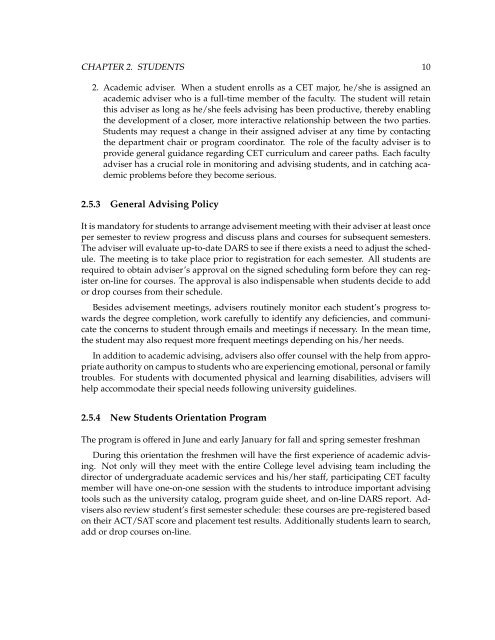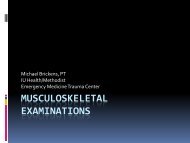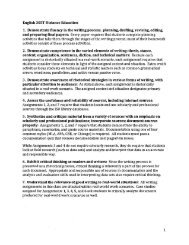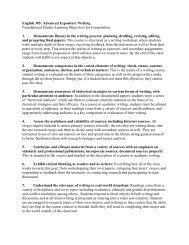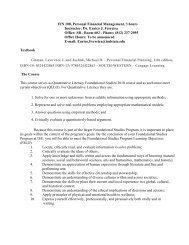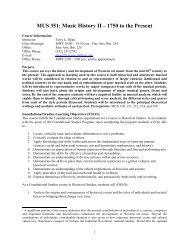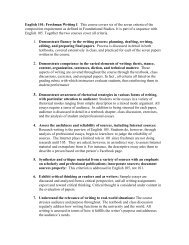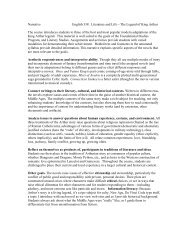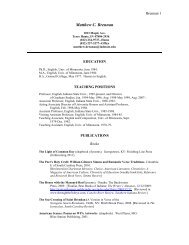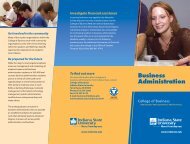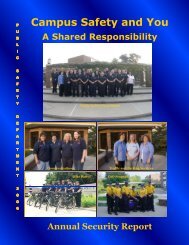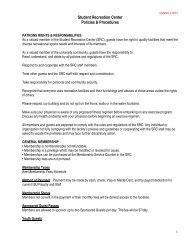- Page 1 and 2: Program Self-Study Report for Bache
- Page 3 and 4: 2.6 Mentoring . . . . . . . . . . .
- Page 5 and 6: 8.1 Adequacy of Faculty Size . . .
- Page 7 and 8: List of Tables 1.1 Contact Informat
- Page 9 and 10: List of Figures 3.1 Program Evaluat
- Page 11 and 12: Preface The Indiana State Universit
- Page 13 and 14: CHAPTER 1. BACKGROUND AND OVERVIEW
- Page 15 and 16: CHAPTER 1. BACKGROUND AND OVERVIEW
- Page 17 and 18: CHAPTER 2. STUDENTS 7 Academic Enro
- Page 19: CHAPTER 2. STUDENTS 9 2.5 Advising
- Page 23 and 24: CHAPTER 2. STUDENTS 13 2.9 Tutoring
- Page 25 and 26: CHAPTER 3. EDUCATIONAL OBJECTIVES 1
- Page 27 and 28: CHAPTER 3. EDUCATIONAL OBJECTIVES 1
- Page 29 and 30: CHAPTER 3. EDUCATIONAL OBJECTIVES 1
- Page 31 and 32: CHAPTER 3. EDUCATIONAL OBJECTIVES 2
- Page 33 and 34: CHAPTER 3. EDUCATIONAL OBJECTIVES 2
- Page 35 and 36: CHAPTER 3. EDUCATIONAL OBJECTIVES 2
- Page 37 and 38: Chapter 4 Student Outcomes In this
- Page 39 and 40: CHAPTER 4. STUDENT OUTCOMES 29 CET
- Page 41 and 42: CHAPTER 4. STUDENT OUTCOMES 31 Tabl
- Page 43 and 44: CHAPTER 4. STUDENT OUTCOMES 33 8. 2
- Page 45 and 46: CHAPTER 4. STUDENT OUTCOMES 35 Perf
- Page 47 and 48: CHAPTER 4. STUDENT OUTCOMES 37 Perf
- Page 49 and 50: CHAPTER 4. STUDENT OUTCOMES 39 Perf
- Page 51 and 52: CHAPTER 4. STUDENT OUTCOMES 41 Perf
- Page 53 and 54: CHAPTER 4. STUDENT OUTCOMES 43 Perf
- Page 55 and 56: Chapter 5 Continuous Improvement an
- Page 57 and 58: CHAPTER 5. CONTINUOUS IMPROVEMENT A
- Page 59 and 60: CHAPTER 5. CONTINUOUS IMPROVEMENT A
- Page 61 and 62: CHAPTER 5. CONTINUOUS IMPROVEMENT A
- Page 63 and 64: CHAPTER 5. CONTINUOUS IMPROVEMENT A
- Page 65 and 66: CHAPTER 5. CONTINUOUS IMPROVEMENT A
- Page 67 and 68: Chapter 6 Curriculum In this chapte
- Page 69 and 70: CHAPTER 6. CURRICULUM 59 No. of Sec
- Page 71 and 72:
Chapter 7 Facilities In this sectio
- Page 73 and 74:
CHAPTER 7. FACILITIES 63 systems, a
- Page 75 and 76:
Chapter 8 Faculty In this chapter,
- Page 77 and 78:
CHAPTER 8. FACULTY 67 8.2 Faculty W
- Page 79 and 80:
CHAPTER 8. FACULTY 69 The faculty a
- Page 81 and 82:
CHAPTER 9. INSTITUTIONAL SUPPORT 71
- Page 83 and 84:
Chapter 10 Program Criteria The ABE
- Page 85 and 86:
CHAPTER 10. PROGRAM CRITERIA 75 Pro
- Page 87 and 88:
2 Present: Indiana State University
- Page 89 and 90:
Present: Indiana State University D
- Page 91 and 92:
Indiana State University Department
- Page 93 and 94:
2 Present: Indiana State University
- Page 95 and 96:
0'13254(68759;:;=,?A@3B3C"DEB34GF H
- Page 97 and 98:
APPENDIX B. ECET (ECMET) DEPARTMENT
- Page 99 and 100:
Appendix C Computer Engineering Tec
- Page 101 and 102:
Indiana State University Computer E
- Page 103 and 104:
2 CURRICULUM ISSUES 2 Indiana State
- Page 105 and 106:
Instructor: E-mail: Phone: Office:
- Page 107 and 108:
Survey ualtrics Survey Software htt
- Page 109 and 110:
1. Technical proficiency by applyin
- Page 111 and 112:
3. Organizational, and increasing l
- Page 113 and 114:
5. Comment (since response to the o
- Page 115 and 116:
7. Individual desire and commitment
- Page 117 and 118:
1. Technical proficiency by applyin
- Page 119 and 120:
3. Organizational, and increasing l
- Page 121 and 122:
5. The ability to function effectiv
- Page 123 and 124:
7. Any general comments on Computer
- Page 125 and 126:
APPENDIX D. INDUSTRIAL ADVISORY BOA
- Page 127 and 128:
APPENDIX D. INDUSTRIAL ADVISORY BOA
- Page 129 and 130:
Appendix E Computer Engineering Tec
- Page 131 and 132:
APPENDIX E. COMPUTER ENGINEERING TE
- Page 133 and 134:
2. How soon did you land your first
- Page 135 and 136:
4. Current Title Text Response Tech
- Page 137 and 138:
6. Technical proficiency by applyin
- Page 139 and 140:
8. Effective communication skills i
- Page 141 and 142:
10. Comment (since response to the
- Page 143 and 144:
12. Comment (since response to the
- Page 145 and 146:
14. Individual desire and commitmen
- Page 147 and 148:
16. Can you specify any courses you
- Page 149 and 150:
18. What are the most significant f
- Page 151 and 152:
20. Any general comments on Compute
- Page 153 and 154:
1. Title Text Response Senior Hardw
- Page 155 and 156:
3. Advanced Degree and Year of Comp
- Page 157 and 158:
5. Comment (since response to the o
- Page 159 and 160:
7. Comment (since response to the o
- Page 161 and 162:
9. Comment (since response to the o
- Page 163 and 164:
11. Comment (since response to the
- Page 165 and 166:
13. Individual desire and commitmen
- Page 167 and 168:
Appendix F Employer Survey F.1 Surv
- Page 169 and 170:
APPENDIX F. EMPLOYER SURVEY 159 F.2
- Page 171 and 172:
2. Effective communication skills i
- Page 173 and 174:
4. The awareness of professional, e
- Page 175 and 176:
6. Individual desire and commitment
- Page 177 and 178:
Appendix G Senior Exit Survey 167
- Page 179 and 180:
2. Are you a student member of any
- Page 181 and 182:
4. Do you feel there is unnecessary
- Page 183 and 184:
6. Student outcomes are succinct st
- Page 185 and 186:
8. Alternatively, can you specify a
- Page 187 and 188:
10. Do you plan to pursue an advanc
- Page 189 and 190:
12. Any general comments on Compute
- Page 191 and 192:
Indiana State University School of
- Page 193 and 194:
Yuetong Lin, Ph. D Electronics and
- Page 195 and 196:
Xiaolong Li,Ph.D. Electronics, Comp
- Page 197 and 198:
Appendix I Curriculum 187
- Page 199 and 200:
APPENDIX I. CURRICULUM 189 Feb-12 C
- Page 201 and 202:
Appendix J Institutional Support 19
- Page 203 and 204:
APPENDIX J. INSTITUTIONAL SUPPORT 1
- Page 205 and 206:
APPENDIX J. INSTITUTIONAL SUPPORT 1
- Page 207 and 208:
APPENDIX J. INSTITUTIONAL SUPPORT 1
- Page 209:
APPENDIX J. INSTITUTIONAL SUPPORT 1
- Page 212 and 213:
APPENDIX J. INSTITUTIONAL SUPPORT 2
- Page 214 and 215:
APPENDIX K. FACILITIES 204 Yuetong
- Page 216 and 217:
Appendix L Articulation Agreements
- Page 218 and 219:
Indiana State University Transfer C
- Page 220 and 221:
Indiana State University Transfer C
- Page 222 and 223:
APPENDIX M. COMPUTER ENGINEERING PR
- Page 224 and 225:
Appendix N Syllabi 214
- Page 226 and 227:
Grading Schedule: Each student will
- Page 228 and 229:
Lab Reports: Lab Reports will be co
- Page 230 and 231:
• use measuring instruments to me
- Page 232 and 233:
ECT 168 Computer Design Technology
- Page 234 and 235:
Exam III 14 File Input/Output Ch 11
- Page 236 and 237:
ADA Policy Indiana State University
- Page 238 and 239:
• Semester exams: Two regular sem
- Page 240 and 241:
ECT 232 Digital Computer Circuits C
- Page 242 and 243:
SUPPLEMENTAL MATERIALS There are ma
- Page 244 and 245:
ECT 281 Robotic Controls Course Syl
- Page 246 and 247:
ECT 281: Robotic Controls SUBJECT L
- Page 248 and 249:
TESTS There will be 5 tests and 1 c
- Page 250 and 251:
ECT301 - Technical Data Management
- Page 252 and 253:
ECT306 Computer Network Management
- Page 254 and 255:
Homework Assignments Homework assig
- Page 256 and 257:
INDIANA STATE UNIVERSITY SCHOOL OF
- Page 258 and 259:
2 8/29 Introduction of Computer Net
- Page 260 and 261:
Course Grading 100-97 = A+; 97-92 =
- Page 262 and 263:
- Encoders • Verilog for sequenti
- Page 264 and 265:
ECT 130- Introduction to Electronic
- Page 266 and 267:
Course Organization This course wil
- Page 268 and 269:
3. Developing skills in the use of
- Page 270 and 271:
Class preparation: It is a general
- Page 272 and 273:
Week 5 technology Week 6 Basic Appl
- Page 274 and 275:
ECT 430 - Senior Seminar Department
- Page 276 and 277:
INDIANA STATE UNIVERSITY SCHOOL OF
- Page 278:
COURSE OUTLINE Topic 1 Topic 2 Topi
- Page 284 and 285:
APPENDIX O. INSTITUTIONAL SUMMARY 2
- Page 286 and 287:
APPENDIX O. INSTITUTIONAL SUMMARY 2
- Page 288 and 289:
APPENDIX O. INSTITUTIONAL SUMMARY 2
- Page 290:
APPENDIX O. INSTITUTIONAL SUMMARY 2


